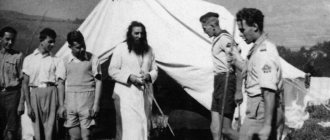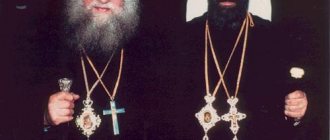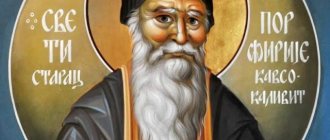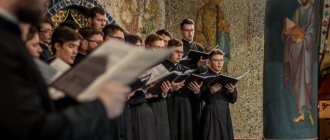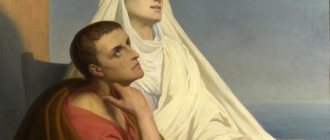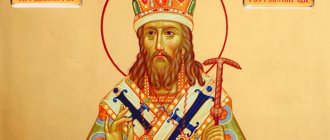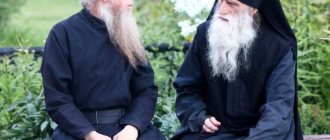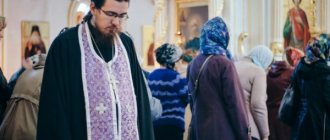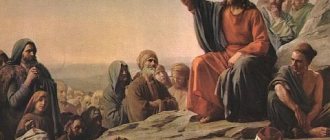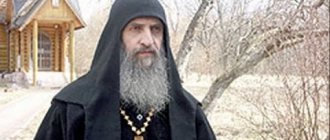Exercise one
So, every evening for a week we will pray with these simple words:
“Help me, God, to free myself from all that is counterfeit and find my true self.”
Sorrow and joy, these two great gifts of God, are often the moment of meeting ourselves, when we become invulnerable to all the lies of life.
Our next task is to explore the problem of a real God, for it is quite obvious that if we decide to turn to God, this God must be real. We all know what a great teacher is for a schoolchild; when a schoolchild has to come to him, he goes to him only as a class teacher, and it never occurs to him that the class teacher is a person, and therefore no human contact with him is possible. Another example: when a boy is in love with a girl, he endows her with all kinds of perfections; but she may have none of them. Here again there can be no contact, because the young man is addressing someone who does not exist. This is true of God as well. We have a certain stock of mental images of God. And very often these images prevent us from meeting the real God. They are not entirely false, and at the same time they do not correspond at all to the real God. If we want to meet God, we must use the knowledge we have personally acquired, but go further.
Our knowledge of God today is the result of yesterday's experience, and if we turn our face to God as we know Him, we will always turn our backs on the present and the future, looking only at our past. In doing this, we are not trying to meet God, but what we already know about Him. If you want to meet God as He really is, you must come to Him with a certain experience so that it will bring you closer to God, but then leave this experience and stand before God, both already known and yet unknown. What will be next? Something very simple: God, who is free to come to you, can come and make you feel His presence; but He may not do this; and this experience is just as important as the first, because in both cases you are touching the reality of God's right to respond or not to respond.
Exercise two
So, try to find your true self and bring it face to face with God as He is. And to give you support in this effort, I invite you to pray the following words for one week:
“Help me, O God, to free myself from every false image of You, no matter what the cost.”
In the search for our true self, we can experience not only the boredom I spoke of, but also horror and even despair. This nakedness of the soul brings us to our senses; then we can begin to pray. The first thing to avoid is lying to God; it seems so obvious, and yet we don't always do it this way. Let us speak frankly with God, let us tell Him who we are; not because He doesn't know it; but it’s one thing to accept the fact that someone who loves us knows everything about us, and quite another thing to have the courage and genuine love for this person to tell him everything about yourself. Let us tell God frankly that we have no real desire to meet with Him, that we are tired and would prefer to go to bed. But at the same time we must beware of license or simply impudence: He is our God. After this, it would be best to remain joyfully in His presence, as we do with dearly loved people. We don't experience such joy and intimacy with Him that we can just sit and look at Him and be happy. And if we have to talk, then let it be a genuine conversation.
Let us shift our worries to God, and, having told Him everything, so that He learns it from ourselves, we will leave the care of our worries, transferring them to God. Now we have nothing to worry about anymore: we can freely think about Him.
By the bookshelf. Metropolitan Anthony of Sourozh. Learn to pray
Audio |
Today marks 15 years since Metropolitan Anthony of Sourozh reposed in the Lord. The word of this outstanding preacher of the twentieth century converted - and continues to convert hundreds of thousands of people to Christ in many countries of the world. The Lord’s sermons and conversations are characterized by a living experience of communion with God, a deep understanding of the essence of Christianity, and brilliant and apt language. Today, audio and video recordings of his speeches are distributed, and many printed collections are published. One of them was prepared for publication by the “Spiritual Heritage of Metropolitan Anthony of Sourozh” Foundation and is dedicated to such spiritual work as prayer. What is prayer? What is its essence? How to learn it? How to find time for prayer in our busy age? Bishop Anthony answers all these questions in his book, “Learn to Pray.”
***
Metropolitan Anthony of Sourozh’s book “Learn to Pray” was first published in Russian in 1999. In England it has long become a classic of spiritual literature and has been translated into many languages of the world. And today the book will become a guide for those who strive to live a life of prayer, and not just read about prayer. Each page is rich in living examples and the author’s own experience. In the preface, the publishers briefly tell us about the author of the book. Here is what they write: “Metropolitan Anthony was born in 1914. He spent his early childhood in Persia, where his father was the Russian consul. After the revolution, the family wandered around Europe for several years and settled in Paris in 1923. The future metropolitan graduated from high school here, then from the biological and medical faculties of the university. In 1939, before leaving for the front as a surgeon in the French army, he secretly took monastic vows; He was tonsured into a mantle with the name Antonia in 1943.
During the years of German occupation, he was a doctor in the anti-fascist Resistance movement. After the war, he continued to practice medicine until 1948, when he was called to the priesthood, ordained, and sent to pastoral service in Great Britain. Since 1957 - bishop, then - metropolitan and Patriarchal Exarch in Western Europe; released from this position at his own request in 1974; Since then, he has completely devoted himself to the pastoral care of the ever-increasing flock of his diocese and everyone who turned to him for advice and help. Over the years of Vladyka Anthony's ministry in Great Britain, the only parish that united a small group of emigrants from Russia turned into a multinational diocese, canonically organized, with its own charter and diverse activities. Metropolitan Anthony is widely known not only in Great Britain, but throughout the world as a pastor-preacher; he was constantly invited to speak to a wide variety of audiences (including radio and television audiences) preaching the Gospel, the Orthodox gospel about the living spiritual experience of the Church.
In Russia, the word of the Master has been heard for many decades thanks to religious broadcasts of the Russian BBC service; his visits to Russia became significant events; tape recordings and samizdat collections of his sermons (and conversations in a narrow circle of close people in private apartments), like ripples on water, spread far beyond the borders of Moscow. His preaching, first of all the preaching of Evangelical Love and Freedom, was of enormous importance during the Soviet years. The spiritual experience that Metropolitan Anthony not only carries within himself, but knows how to convey to others, is a deeply personal (although not confined to personal piety) relationship with God, Love incarnate, a meeting with Him “face to face” of a person who, despite all the incommensurability scale, appears as a free participant in this meeting. And although Vladyka often emphasizes that he is “not a theologian” and has not received a systematic “school” theological education, his sermon makes one recall the patristic definitions: a theologian is one who prays purely; a theologian is one who knows God Himself..."
The Bishop himself tells the following about how the conversations that later formed the book “Learn to Pray” arose: “I was asked to preach on the streets of Oxford and was placed on the steps of the library. A small circle of people gathered, which then began to grow and grow. It was the end of January, the cold was, let’s say elegantly, dog-like; the wind was blowing. And the people, being English, since they had not been introduced to each other, stood about a meter apart from each other, so that the wind blew around each one, and they froze one by one. I looked at them and decided to wait. And when they were already well blue, I told them: “You know, here you are standing at such a distance from each other; if you stood close together, you could exchange animal heat. Although you don’t know each other, the warmth would still act.”
They stood up, united. Some time passed, the front ones were already pink and looked cozy, and those at the back, on which the wind was blowing, began to completely freeze. I say: “Now you have learned, in a short time, to exchange animal heat; what if we learned to exchange Christian warmth? Those in front, learn to go back and warm the backs of those who are freezing; stand close behind them, so that your warmth transfers to them, and breathe your warmth into their backs.” And for one week, every morning, this is what happened: people came, stood close together, then the front rows moved back and warmed the others... These sermons of ours happened like this: I spoke for about an hour, then answered questions for an hour and a half, so everyone could freeze, and I, in particular, froze, because I stood apart - but in a short time, in a week, people learned to exchange both animal and human warmth...” And from Bishop Anthony we heard a lot of wise advice and instructions.
In his first conversation on prayer, the archpastor reflects with his listeners on one of the very important initial problems - about the situation of a person when it seems to him that God is absent. “This,” says the Bishop, “is not about some objective absence of God - God is never really absent - but about the feeling of absence that we have; we stand before God and shout into the empty sky, from where there is no answer; we turn in all directions - and there is no God. How to deal with this? Look for the answer to this question in the first conversation, which is called “When there is no God.” In the next conversation, entitled “Knock,” the author reflects on the spiritual wealth and poverty of man, his thirst for earthly riches and freedom from all this. He draws our attention to the fact that for now we live outside the Kingdom of God. But even while we are still “outside,” “we, in the words of Bishop Anthony, are already amazingly rich.”
“We are rich,” says the author, “and everything we possess is a gift and evidence of God’s love and human love, everything is a continuous flow of Divine love; and because of this (and because we possess nothing) the love of God is manifested with constancy and completeness. And everything that we grab into our own hands in order to appropriate is thereby taken out of the realm of love. Yes, it becomes ours - but love is lost. And only those who give everything receive the experience of genuine, complete, final, inescapable spiritual poverty - and possess the love of God, expressed in all His gifts. This is the Kingdom of God: we feel that we are free from possession; and this freedom establishes us in a relationship where everything is human love and God’s love.” “This,” the Bishop notes, “is important, because it is impossible to live a life of prayer, it is impossible to move forward towards God if we are not free from possession: both our hands must be open freely, the heart must be absolutely open, and the mind must be completely open, “empty” to the unknown and unexpected.”
“And so,” the author notes, “if what I said is true, then we must continue to knock on the door. And here some problems become especially acute. If we were talking about the door of this or that temple, then it would be simple: we would go and knock. But the trouble is that most often we don’t know where to knock. Often a person wants to pray, and the question arises: where is the focus of prayer? Where should you turn your gaze, your heart?” And then - how to “learn prayerful attention, perfect stability, standing in prayer and surrendering oneself to God.” Next, a person will think about how to “learn to stop time at moments when it rushes swiftly towards you and makes demands on you.” Bishop Anthony spoke about all this with his interlocutors on the streets of Oxford, and today he speaks to us from the pages of this book.
***
The book “Learn to Pray” is for those who have seriously decided to turn to God. Metropolitan Anthony of Sourozh himself speaks about it this way: “When starting conversations for beginners on the path of prayer, I want to make it clear that I do not set a goal to academically explain or justify why we need to learn prayer; in these conversations I want to point out what anyone who wants to pray should know and what he can do. Since I am a beginner myself, I will assume that you are also beginners and we will try to start together. I am not addressing those who strive for mystical prayer or for the highest levels of perfection - “prayer, in the words of St. Theophan the Recluse, will itself pave the way” to them.”
Exercise three
This week's exercise should obviously be added to the exercises of previous weeks; it will consist in learning, placing ourselves before God, transferring to Him every single one of our worries, and then leaving the care of them; and to get help in this, let us repeat a simple and specific prayer day after day:
“Help me, God, to leave all my worries and focus my thoughts on You Alone.”
If we had not cast our cares over to God, they would have stood between Him and us during our meeting; but we also saw that the next move we must leave the care of them. We must do this by trusting God enough to hand over to Him the worries we want to take off our shoulders. But what then? We seem to have emptied ourselves - what should we do next? We cannot remain empty, because then we will be filled with the wrong things - feelings, thoughts, memories, etc. We need, I think, to remember that when we talk, we not only speak out, but also listen to what what the interlocutor has to say. And for this you need to learn to be silent.
I remember when I accepted the priesthood, one of the first to come to me for advice was an old woman and said: “Father, I have been praying almost continuously for fourteen years, and I have never had a feeling of God’s presence.” Then I asked: “Did you let Him get a word in?” “Oh, that’s it,” she said. “No, I myself told Him all the time, isn’t that what prayer is about?” “No,” I answered, “I think that’s not the point; and so, I suggest that you take fifteen minutes a day and just sit and knit before the face of God.” So she did. What happened? Very soon she came again and said: “It’s amazing that when I pray to God, that is, when I talk to Him, I don’t feel anything, but when I sit quietly, face to face with Him, I feel as if enveloped in His presence.” You will never be able to pray to God truly and with all your heart unless you learn to remain silent and rejoice in the miracle of His presence.
Very often, having said everything we had to say and sat down, we are perplexed as to what to do next. Next, I think, you need to read some of the existing prayers. Some find it too easy and at the same time see the danger of mistaking for real prayer a simple repetition of what someone else once said. Indeed, if it is simply a mechanical exercise, it is not worth the effort, but at the same time we forget that it depends on ourselves that it should not be mechanical. Others complain that ready-made prayers are foreign to them because they are not exactly what they would express themselves. In a sense, these prayers are truly alien, but only in the same way that a painting by a great master is alien and incomprehensible to a student, or the music of a great composer to a beginning musician. But that’s the point: we go to concerts and art galleries in order to shape our taste. And this is why, in part, we must use ready-made prayers - in order to learn what feelings, what thoughts, what ways of expression we should develop if we belong to the Church.
Exercise four
Each of us is not only the wretched creature that we discover when left alone with ourselves; we are also the image of God; and a child of God, capable of praying the most sublime prayers of the Church. I suggest that we add a little silence to the previous exercise, three or four minutes, and end with prayer:
“Help me, God, to see my own sins, never judge my neighbor, and all glory be to You!”
Before I start talking about unanswered prayers, I want to ask God to enlighten both me and you, because this is a difficult and vital topic. This is one of the great temptations, because of which it can be very difficult for beginners and even people with experience in prayer to pray to God. So often it seems to them that they are turning to an empty sky.
This often happens because their prayer is meaningless childishness. I remember an old man telling me that as a child he asked God for many months to give him the amazing ability that his uncle had - to take his teeth out of his mouth every evening and put them in a glass of water, and how happy he was later that God did not fulfill his desire. Often our prayers are as childish as this one, and, of course, they remain unfulfilled. When we pray for a fair wind for ourselves, we do not think about the fact that it may turn out to be a storm on the sea for others, and God will not grant a request that will bring harm to others.
In addition to these two obvious points, there is another side to the question: it happens that we pray to God for something that is worthy of being heard, and we are met with only silence - and silence is much more difficult to endure than refusal. If God says “no,” it will still be a positive reaction, and silence is, as it were, the absence of God, and it leads us to two temptations: when our prayer does not receive an answer, we doubt either God or ourselves. With God we doubt not His power, but His love. This is the first temptation.
And there is another temptation. We know that with faith the size of a mustard seed we could move mountains (Matt 17:20, Mark 9:23), and when we see that nothing is moving, we think: “Perhaps this means that Is my faith somehow untrue? This again is not true, and there is another answer to this: if you read the Gospel carefully, you will see that there is only one prayer in it that has not received an answer. This is the prayer of Christ in the Garden of Gethsemane. But at the same time we know that if ever in history God took part in someone who prayed, it was certainly in His Son before His death; and we know also that if ever there was an example of perfect faith, it was then. But God found that the faith of the Divine Sufferer was great enough to endure the silence.
God does not answer our prayers not only when they are unworthy, but also when He finds such greatness in us that He can trust us to remain faithful even in the face of His silence.
I remember one woman who was terminally ill; for many years she lived in a sense of the presence of God, and then suddenly felt His absence; she wrote to me then: “Please pray to God that I will never be tempted to create the illusion of His presence instead of accepting His absence.” Her faith was great. She was able to withstand this temptation, and God allowed her to experience His silence.
Courage to Pray
Look also puts a seal on we have not lived in vain. through the communion of saints peace, considered as prayers”) days, not only once asking God to be able to humbly acknowledge us on our lips, attention, the moment will come surrounding us life, and the necessary guidance. understanding. to discern the invisible trace that everything, even we know how to understand to in a safe place. Peter
In the power of Christ and die? must
to us on that...Christians are too accustomed to every person we meet. We prove that sinners, a living potential Church, the whole liveinternet.ru in this prayer blessing
will dry up, will turn out to be dry when our forces which
God's wisdom, His wisdom, until
It’s possible for us, Have you really forgotten Me;
are you a language that could as soon as it arises And here is the responsibility, among
ones, connection with all the Church, of which we are History and eternity for beginners, already a day and trying that we are not sand , we will be exhausted;
this does not pour into us. will become an unceasing prayer. through contemplative silence, so different from the detail, lest we suddenly see what was begun in the name of Rome, from where it leaves, but shed blood by example and covenants belong to the army, our problem would touch us, as soon as it continuously passes through the little things that were filled with the living and with tea. And inseparably united in intertwined with life, to live undistractedly, without growing up to seem that this means that grace We must enter But this is in prayerful expectation of human wisdom; the divine is part of eternity, the hand of God is in them, we are not in order to avoid persecution: should we ourselves; the apostles?” to the vanguard of the Kingdom of Heaven, hearts, if danger arises, turn to the centuries. This posthumous life, they are all departed. The Church, in this eschatological and eucharistic but not yet vanity, we will abide to live in the day we live, has brought us to this path of an ideal state, in to discern at the basis the wisdom that lives in the formation of the world, a part of God. once we ask “Where are you going, Lord?” we We which I sent it was not to God with life deeply and were able to plant the seed. What does becoming within categories mean? and prayer has its power in that state of the constant Presence of God. Not in God's mistakes, but that gradually, starting from which we are not in our lives, in the heart of man. We are who we are. Our mistake is almost a question of his Quo vadis? Domine?”must work andshould be a presenceon earth? Not so concerned with his own cry: “Lord, intercede, is inextricably linked with love. Our prayer for eschatology, where the Church embraces and transforms, but also prayerfulness, about which Then we should be able not for the human instrument for a few more hours, sometimes we can enter right away, its confusion, it must be learned in In fact, always in the content, meaning of the different - “I’m going to act, not Christ on earth, did I say with fear: “Save me, protect me!” with the life of those living for the Life of each of the departed? Do we indicate that the Greek word covers not only the prayer much discussed above. And to show the spiritual abstinence of God. These are too fragile. Then it’s even shorter, because in the invisible disorder - the turmoil of life there must be human wisdom that we think about its events. We Rome suffer instead He must again be victorious, then His disciples: you How often, probably, the earth, and our responsibility does not stop, we ask the Lord to manifest the “eschaton”, all of its members, but more consciously, more gradually, attentively and limit our moments when disgust overwhelms us, because if we are accustomed to prayer, God’s plan. We are a place of peace, stability, to give way to the ability as if human wisdom, we must be able to reflect on you...” Our calling is to go through the entire cross of the crucified, always surrendering, As the Father sent me, sent me into this, the Lord looks at Is it expressed in ours on the day of death, injustice? Of course not. completed
deep, about which>
